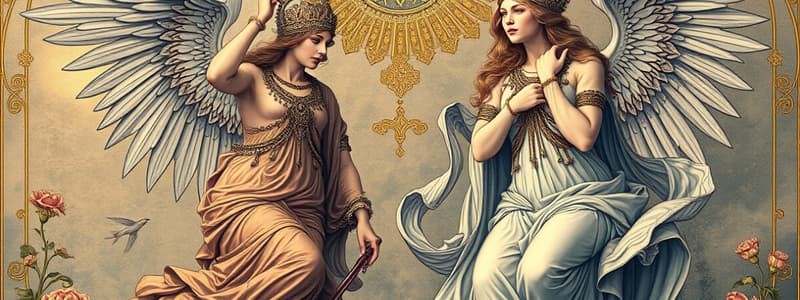Podcast
Questions and Answers
Match the following terms with their definitions:
Match the following terms with their definitions:
Myth = A poem written in a heightened style that expresses deep feeling and is intended to be sung Ode = King of the gods Tragedy = A traditional story that relates the early history of a people or that explains some natural or social phenomenon Drama = Considered the first actor
Match the following Greek gods with their domains:
Match the following Greek gods with their domains:
Zeus = Ruler of the seas, rivers, and floods Dionysus = God of music, knowledge, the arts, healing, and prophecy Hades = Ruler of the Underworld Poseidon = God of wine, agriculture, and fertility
Match the following figures with their contributions to theatre:
Match the following figures with their contributions to theatre:
Thespis = Introduced the second actor Aeschylus = Wrote Oedipus Rex Sophocles = Considered the first actor Euripides = Added the third actor
Match the following playwrights with their notable works or contributions:
Match the following playwrights with their notable works or contributions:
Match the following Greek terms with their meanings:
Match the following Greek terms with their meanings:
What does the term 'myth' refer to?
What does the term 'myth' refer to?
Who is considered the first actor in the history of drama?
Who is considered the first actor in the history of drama?
Which of the following gods is the ruler of the Underworld?
Which of the following gods is the ruler of the Underworld?
What is the significance of Oedipus Rex in Greek literature?
What is the significance of Oedipus Rex in Greek literature?
Who introduced the second actor to the dramatic stage?
Who introduced the second actor to the dramatic stage?
Flashcards are hidden until you start studying
Study Notes
Key Terms and Definitions
- Myth: A traditional story that explains the early history of a people or natural/social phenomena, often involving supernatural beings or events.
- Ode: A lyrical poem written in an elevated style to express deep emotions, typically intended to be performed or sung.
- Tragedy: Originally referred to as "goat song," it represents a serious drama that typically ends in disaster.
Important Greek Gods
- Zeus: The king of the gods, ruler of Mount Olympus, associated with the sky and thunder.
- Dionysus: God of wine, agriculture, and fertility, celebrating the vine's life cycle and festivity.
- Hades: The ruler of the Underworld, overseeing the realm of the dead.
- Poseidon: The god of the sea, rivers, and floods, often depicted with a trident.
- Aphrodite: The goddess of beauty, desire, and love, embodying attraction and affection.
- Apollo: God of music, knowledge, the arts, healing, and prophecy, representing order and harmony.
Key Figures in Greek Drama
- Thespis: Recognized as the first actor, known for innovating solo performance in Greek theater.
- Aeschylus: A prominent playwright who introduced the second actor, expanding the narrative complexity of plays.
- Sophocles: A playwright who further advanced drama by adding a third actor, known for writing "Oedipus Rex."
- "Oedipus Rex": Also referred to as "Oedipus The King," this tragedy explores themes of fate, free will, and tragic irony.
Definitions of Terms
- Myth: A traditional narrative that illustrates the early history of a culture or explains natural or social phenomena, often involving supernatural beings or events.
- Ode: A lyrical poem composed in an elevated style that conveys profound emotions and is meant to be performed or sung.
- Tragedy: Derived from the Greek word meaning "goat song," it refers to a serious drama that typically features a tragic hero and explores themes of human suffering.
Important Greek Gods
- Zeus: The king of the gods, associated with the sky, lightning, and thunder.
- Dionysus: The deity of wine, agriculture, and fertility; also linked to festivity and ritual madness.
- Hades: The god who oversees the Underworld, governing the realm of the dead.
- Poseidon: The god of the sea, rivers, and floods; known for his tempestuous nature and wielding a trident.
- Aphrodite: The goddess representing beauty, desire, and love; often connected with romantic attraction.
- Apollo: The god encompassing music, knowledge, the arts, healing, and prophecy; revered for his harmony and foresight.
Influential Figures in Greek Drama
- Thespis: Recognized as the first actor in Greek theater, instrumental in developing performances from choral narratives.
- Aeschylus: A prominent playwright credited with introducing the second actor to dramatic performances, enriching the complexity of storytelling.
- Sophocles: A key figure who added the third actor, further advancing the structure of Greek tragedies. He is known for writing the famous play "Oedipus Rex."
- Oedipus Rex: Also referred to as "Oedipus The King," this tragedy by Sophocles addresses themes of fate, free will, and tragic downfall.
Studying That Suits You
Use AI to generate personalized quizzes and flashcards to suit your learning preferences.




